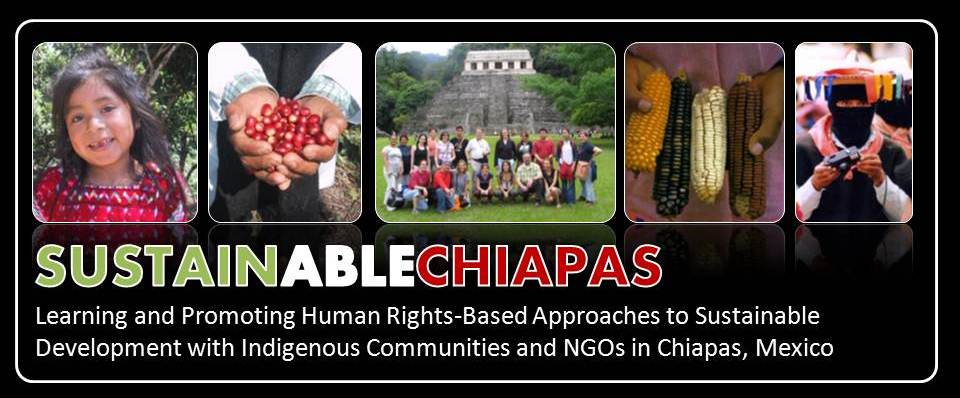 The Civil Society Organization called "Las Abejas", or "The Bees," is a Christian pacifist group of indigenous Tztotzil Mayan people. It was founded in the locality of Tzajalchen, Chenalho, in the highlands of Chiapas, Mexico in 1992 following a familial property dispute that left one person killed. When members of the community took the injured man to the nearest town for medical attention, they were accused of attacking him themselves and jailed. When family members realized what had happened, they began a pilgrimage on foot to San Cristóbal de Las Casas. Along the way, Christian pacifists in other villages joined the group, which is dedicated to peace, justice, and anti-neoliberalism. Las Abejas freed their companions and grew as an organization.
The Civil Society Organization called "Las Abejas", or "The Bees," is a Christian pacifist group of indigenous Tztotzil Mayan people. It was founded in the locality of Tzajalchen, Chenalho, in the highlands of Chiapas, Mexico in 1992 following a familial property dispute that left one person killed. When members of the community took the injured man to the nearest town for medical attention, they were accused of attacking him themselves and jailed. When family members realized what had happened, they began a pilgrimage on foot to San Cristóbal de Las Casas. Along the way, Christian pacifists in other villages joined the group, which is dedicated to peace, justice, and anti-neoliberalism. Las Abejas freed their companions and grew as an organization. When the Zapatista Army of National Liberation uprising took place in 1994, Las Abejas stood in solidarity with the demands for justice, democracy, education, health, land and dignity for the indigenous people as expressed by the Ejercito Zapatista de Liberacion Nacional (EZLN). However they separated themselves from their violent means of achieving change and proclaimed themselves as "active nonviolent" civil society organization.
When the Zapatista Army of National Liberation uprising took place in 1994, Las Abejas stood in solidarity with the demands for justice, democracy, education, health, land and dignity for the indigenous people as expressed by the Ejercito Zapatista de Liberacion Nacional (EZLN). However they separated themselves from their violent means of achieving change and proclaimed themselves as "active nonviolent" civil society organization.They paid a high price for their support however, when on December 22nd, 1997, forty-five of their members were massacred while praying in a church, in what's come to be known as the Acteal Massacre.
The Las Abejas logo, often used in the press communiques, symbolizes the sufferings and hope from Acteal (and its "Columna de la Infamia" or 'Pillar of Shame' at the center of the world.
Today, Las Abejas is a civil society movement represented by the civil society leadership in Acteal representing their demands for justice, reparation and human rights after the massacre and ongoing situations of paramilitary presence. Las Abejas of Acteal plays an important symbolic role for the catholic Church and oppressed indigenous groups in resistance.
Las Abejas is also represented by the "returned" displaced people in Nuevo Yibeljoj, organized as a Las Abejas Mexico civil association (A.C.) and seeking the government cooperation to recuperate their lost properties.
Tzajalchen remains also important for The Abejas as the founders remain quite active in the monitoring of the integrity of the organization, its national presence and international relations. They also play a vital role for helping young leaders elected in the yearly renewed "mesa directiva" (board of directors) and other service-leadership roles (cargos) of the organizations.
Dr. Marco Tavanti, explains the history and evolution of the Civil Society Las Abejas in the Highlands of Chiapas, Mexico from 1992 to 2010.
Video Documentary on the Acteal massacre after 10 years. This version includes subtitles in English.
Acteal; Ten years of impunity from Koman Ilel on Vimeo.
Interview with Diego Cadenas Gordillo, Legal Defense Director of the Fray Bartolomé de Las Casas Human Rights Center (Frayba) about their legal accompaniment of Las Abejas and their opinion on the Mexican supreme court decision to release people convicted in the Acteal massacre (Spanish)
To learn more about the struggle, conflict and suffering of Las Abejas in massacre of Acteal and the internal displacements of people in the context of the Zapatista insurgency and paramilitary and military counterinsurgency in Chiapas, see this video: The Victims of the War In Chiapas
Please read the Acteal Blog of Las Abejas for updated news and communications.
Read the Las Abejas website for additional information on the Civil Society Las Abejas.